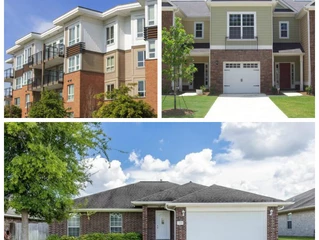Consider these pros and cons before you buy:
Now that you’ve decided to take the plunge and dive into the Metro D.C.-area real estate market, you need to decide on the type of housing situation that’s best for you. Whether purchasing your new home by yourself or with your partner, it’s important to realize that this can be a confusing and stressful decision.
Buying a home is a major commitment. Your personality, priorities, and needs all come into play. It’s wise to imagine not only your current situation, but also what your life might be like in the future. For example, is there a possibility of living with a partner (if you’re single), or having a child or children, or sharing your home with aging parents? Or, even though you might not have a pet now, what if you decide to get that Lab you always wanted?
To help you organize your thoughts, we have listed the advantages and disadvantages of the three most common types of home ownership in our market: (1) a single-family home, (2) a townhome, and (3) a condominium.
Single-Family Home (SFH)
Advantages: If you are a control queen, then this choice is for you! An SFH provides you with the freedom to do pretty much whatever you want to your home and land, as long as you follow the city or county codes. You can add on, renovate, plant a garden, put up a fence, or build a deck, and all will be fine. Without any shared walls, privacy is high, and you tend to have fewer problems with neighbors.
Disadvantages: On the down side, you must pay for all utilities, repairs, maintenance, and landscaping. An SFH may often blindside you with unexpected major expenses—like the need to replace the furnace or roof—so be prepared! Those costly surprises can have an impact not only your bank account, but on your relationship, as well.
Townhome (TH)
Advantages: If Sunday morning trips to Home Depot or Lowe’s don’t thrill you, then a TH might be the right choice. With a smaller yard and little responsibility for exterior maintenance and repairs, you’ll spend less time taking care of the house and lawn, enabling more time to play. You might also appreciate the amenities that some THs offer, such as a pool, a workout room, and a tennis court.
Disadvantages: Along with the perks, however, come the Homeowners Association (HOA) fees—often steep—for which you are responsible. Given the shared walls, privacy is often limited. In addition, there are rules concerning exterior changes to your TH. You creative types might wind up feeling frustrated if the HOA disapproves of your proposed exterior color scheme.
Condominium (CM)
Advantages: If you don’t have a lot to spend, then purchasing a CM is generally the least expensive way to enter the housing market, depending on location. Your monthly CM fees cover most exterior repairs and the building’s maintenance. In D.C., many folks opt to go car-free when living in a CM. Doing so can encourage healthy walks and use of public transit—and might save you a lot of money.Also, when you are ready to move, depending on your financial situation, you could keep your CM as an investment property and rent it (and maybe even have a positive cash flow).
Disadvantages: You must pay CM fees each month. There is less privacy—in fact, you might get to know your neighbors better than you had ever hoped (e.g., what time they get up in the morning and their favorite television shows)! In addition, you won’t be able to let your dog roam around the fenced yard. And, be advised that a “luxury” condo can be quite expensive in Bethesda and Silver Spring, MD, as well as in D.C.
Do Your Homework
Take your time and create your own list of pros and cons. Do all of your research before you decide which route to follow. Brainstorm with your partner, friends, supportive family members, and your real estate agent. And, most important, given the enormity of this decision, don’t allow yourself to be pressured. With adequate preparation, buying a home can be an enjoyable and rewarding process.






